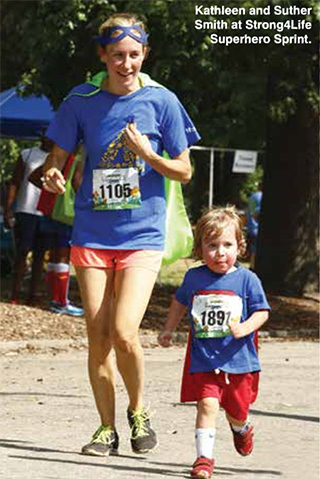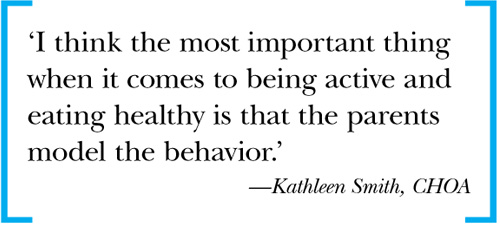There is no question more important to a parent than: “How can I raise my child to be healthy in all ways?”
Obesity has become a global concern in recent decades and the epidemic is not limited to adults. According to the Centers for Disease Control and Prevention, about one in every five children is considered medically obese. In Georgia alone, nearly 1 million children are overweight or obese, according to the National Survey of Children’s Health.
September is National Childhood Obesity Month, wherein medical professionals, help groups and parents are encouraged to come together to learn about the risks associated with the condition. Health professionals overwhelmingly agree that the best way to reduce child obesity rates is to educate parents on the causes and risk factors for obesity and how to help their children make healthier choices.
 Physical Causes and Risks
Physical Causes and Risks
Studies show that childhood obesity can lead to more health issues down the road. UC San Diego Health, a hospital and health care system associated with the University of California at San Siego, notes a connection between being overweight as a child and high blood pressure and cholesterol levels that increase the likelihood of cardiovascular disease. There are also links between obesity and impaired tolerance to glucose and insulin resistance; thus, obese children risk getting Type 2 diabetes.
UC San Diego Health also makes a distinction between those short-term consequences and more long-term issues. Namely, obese children are much more likely to become obese adults. Children often take with them into adulthood the habits of their parents.
Dr. Chris Griffith, a general adult, child and adolescent psychiatrist who practices with Kaiser Permanente, notes that the CDC has projected that by 2020, 75 percent of all Americans will either be obese or overweight. Griffith believes the critical age for determining whether obesity will be a concern in later years is age 5. “Before the age of 5, one’s weight is primarily determined by heredity — parents, grandparents. After age 5, [weight] is determined by the individual — your eating patterns, your behavior, what your fat cells are like,” he says.
Contributing Mental Factors

Mental causes and effects of childhood obesity often go unremarked in the discourse around the disease, but they can be just as impactful. The situation is especially difficult in young children when psychological factors can be hard to pinpoint.
“If you’re bullied, if you’ve got depression, if you’ve got anxiety; all of those things may further add to weight problems,” Griffith says. “All of us, in some way or another, use food as comfort.”
Griffith expands on that concept by noting that, in our society, when something good happens in our lives, we often celebrate with a big meal. When something bad happens, some people also tend to overeat in an effort to soothe anxiety or negative emotions.
Dr. Tina Vothang, a general pediatrician with WellStar Health System, notes another, more insidious problem with childhood obesity: It can affect specific groups of individuals more than others, even along economic lines. “I think that it starts with families, and I think there is a socioeconomic factor as well. Fruits and vegetables and healthy produce are expensive,” Vothang says. “In our society, parents are working long hours and it can be more difficult to prep meals and make dinners.”
The State of Obesity is a project initiated by the Trust for America’s Health and Robert Wood Johnson Foundation. For the past 12 years, The State of Obesity created annual reports to help raise awareness of the obesity epidemic. The report notes a disparity between children of white families and children of black families — from 1999-2012, 14 percent of white children aged 2 to 19 were obese; while the percentage of black children in the same age and range was closer to 20 percent. The report also notes that 38 percent of African-American children under the age of 18 live below the poverty line.
Access to food and taking the time to prepare it are not available equally to everyone and continues to be a problem for this generation of young people. With so many factors contributing to the epidemic of childhood obesity, experts are hoping they can help parents take the necessary steps to raise healthy sons and daughters.
How to Make Weight Loss Fun
With the mission to arm parents and caregivers with the tools needed to better support a healthier home environment, Children’s Healthcare of Atlanta’s Strong4Life program serves as a resource for parents looking to learn more about childhood obesity. Strong4Life offers tips, facts and advice from doctors, nutritionists and wellness experts. Recent Strong4Life sponsored studies reveal that kids that are overweight by age 6 have a 70-80 percent chance of becoming overweight adults.

Kathleen Smith is a wellness program and exercise specialist with Children’s Healthcare of Atlanta, and she also works with the Strong4Life program. Smith points out something that often goes overlooked when parents are trying to instill healthy attitudes in their children: Being healthy can be an enjoyable process. For her, it is just as important to have children enjoy eating their vegetables as it is for them to get their nutrients.
“I think the most important thing when it comes to being active and eating healthy is that the parents model the behavior. If my child sees being active and eating healthy is important in my life, they’ll be more likely to do it,” says Smith.
Smith also has tips for parents who don’t have access to local parks or gyms where they might take their children for physical activity. Getting creative can lead to discoveries that are fun for the parents just as much as their children. “[My son and I] pretended we were different animals. We pretended we were cheetahs, which were my favorite because we just ran a lot, and we ran circles around the den and the kitchen,” Smith recalls. “We would call out different animals, we hopped like frogs — whatever that animal was, we did that activity.”
But what about older children? “What I usually tell our Strong4Life families with older kids is it’s really important for the parents to engage that child. Ask them about ways they like to be active or would like to try out to be active,” Smith says, again noting the importance of finding an activity that the child likes to do.
Vothang is similarly adamant that it is the responsibility of parents to nurture their children into healthy adults. “I tend to put 100 percent of the onus on the parents … it really is a top-down approach.”
Healthy snacking is another concern for parents, but Vothang, Griffith and Smith all concur on one rule: no juice. Vothang notes that there is simply not enough benefit, even in 100 percent juice options, mainly due to the sugar content, and asserts there’s a better way to get those nutrients. “One of the things that I do encourage is making smoothies together. They’re a really great way to get your fruits and vegetables,” she says. “A lot of the time I’ll challenge the kids to come up with different smoothie recipes, and then that’s one way they can get involved in going to the grocery store and picking out different fruits and vegetables and it being their idea.”
When it comes to childhood obesity, parents are responsible for making healthy changes in their children’s lives, and involving children in the process is a great way to make those changes stick. All of the professionals strongly suggested parents consult their pediatrician for health advice and to follow up on suggestions to see what adjustments have a positive impact on their child’s health.
For more information on childhood obesity and tips for parents and guardians visit:
Keeping Kids Active
David Van Vurst, franchise owner and business development operator for Sky Zone Kennesaw, says their primary attractions, Main Court, Sky Slam, Foam Zone and Dodgeball, are sure to keep kids sweating and having fun for hours.
 “In today’s society with video games, smart phones and the internet, I believe kids have lost the youthful fun associated with physical activities,” he continues. “The freedom when jumping at Sky Zone is contagious and kids won’t even realize they are exercising. I always say an active, healthy kid will be a happy, healthy adult!”
“In today’s society with video games, smart phones and the internet, I believe kids have lost the youthful fun associated with physical activities,” he continues. “The freedom when jumping at Sky Zone is contagious and kids won’t even realize they are exercising. I always say an active, healthy kid will be a happy, healthy adult!”
Van Vurst adds that for children who are a little more competitive, Sky Zone even offers a Youngstars Dodgeball league for kids ages 11-15. Some of the coaches have played in the world championships in Las Vegas and they are working to build the next Ultimate Dodgeball generation right in Cobb County.
To learn more about the location at 1650 Airport Road in Kennesaw, call (678) 426-4400 or visit skyzone.com/kennesaw online.

















